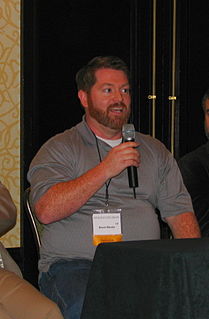A Quote by Stephan Jenkins
What we value about music and literature are the moments that they create in our minds when we encounter them.
Related Quotes
One of the things I always underscore when I teach criticism is that young critics, or would be critics, frequently have this illusion that if they write about music they're somehow part of music, or if they write about movies they're part of movies, or of they write about theater they're part of theater, or write about literature. Writing is a part of literature, we belong the species of literature. If you add all the music reviews together that have ever been written, they don't create two notes of music.
I perceive value, I confer value, I create value, I even create — or guarantee — existence. Hence, my compulsion to make “lists.” The things (Beethoven’s music, movies, business firms) won’t exist unless I signify my interest in them by at least noting down their names. Nothing exists unless I maintain it (by my interest, or my potential interest). This is an ultimate, mostly subliminal anxiety. Hence, I must remain always, both in principle + actively, interested in everything. Taking all of knowledge as my province.
I think artists can influence only through making music that challenges people, excites them and flips them out. Music that repeats what you know in ever-decreasing derivation, that's unchallenging and unstimulating, deadens our minds, our imagination and our ability to see beyond the hell we find ourselves in.
No scientist knows the world merely by holding it at arm's length: if we ever managed to build the objectivist wall between the knower and the known, we could know nothing except the wall itself. Science requires an engagement with the world, a live encounter between the knower and the known. That encounter has moments of distance, but it would not be an encounter without moments of intimacy as well. Knowing of any sort is relational, animated by a desire to come into deeper community with what we know.
I consistently encounter people in academic settings and scientists and journalists who feel that you can't say that anyone is wrong in any deep sense about morality, or with regard to what they value in life. I think this doubt about the application of science and reason to questions of value is really quite dangerous.
Wherein lies a poet's claim to originality? That he invents his incidents? No. That he was present when his episodes had their birth? No. That he was first to repeat them? No. None of these things has any value. He confers on them their only originality that has any value, and that is his way of telling them." Mark Twain "...every literature, in its main lines, reflects the chief characteristics of the people for whom, and about whom, it is written.
I only ever really follow the music, that's what I'm about, I don't think about it too much. I just wanted to make a piece to sleep through, to sort of explore that sleeping space as a listening space and to have a different encounters between our listening minds or hearing minds and music. I think that's really interesting. After that I feel I've done my job.



































